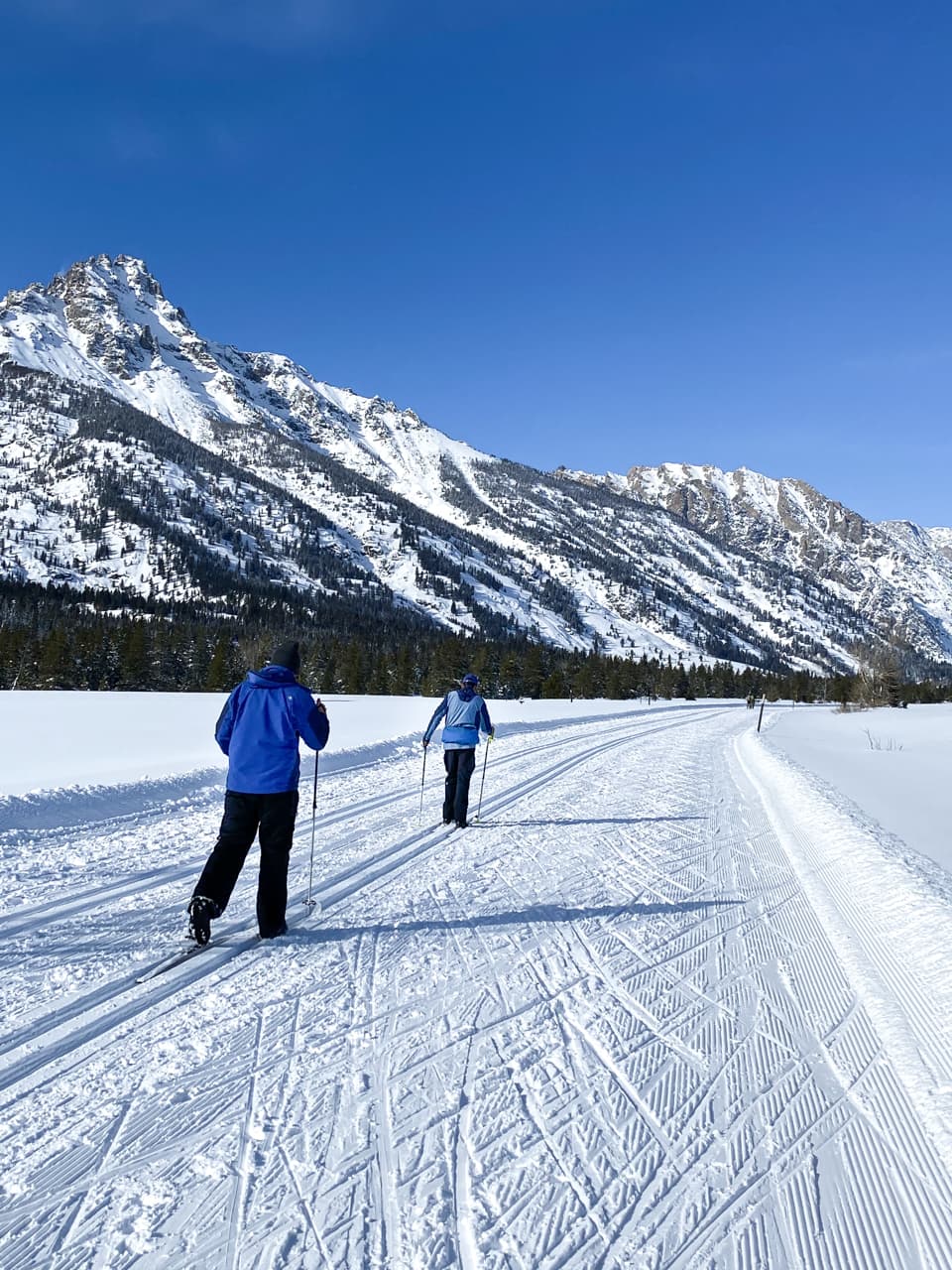
Teton Park Road, Moose-Wilson Road, and Signal Mountain Summit Road within Grand Teton National Park are now open to cross-country skiing, skate skiing, snowshoeing, and walking. Once snow begins to accumulate on the roadbeds, the designated portions of these roads may accommodate winter recreation, and the use of wheeled vehicles is prohibited for the season.
Bicycles, including, snow/fat/electric bikes, are not permitted on roads designated for over-snow access. Bikes are allowed on roadways open to motor vehicle use in Grand Teton National Park.
The 14-mile section of the Teton Park Road between the Taggart Lake Trailhead and Signal Mountain Lodge will be groomed approximately three times a week dependent on snow and weather conditions.
- Tuesdays- Four lanes groomed Taggart to South Jenny Lake
- Fridays- Two lanes groomed Taggart to Signal Mountain
- Sundays- Four lanes groomed Taggart to South Jenny Lake
Grooming is anticipated to begin soon and will continue through mid-March, as conditions allow. Grooming is made possible through the financial support of the Grand Teton National Park Foundation and a Federal Highway Administration Recreational Trails Program grant managed by the State of Wyoming. For grooming updates, call the park’s road information line at 307-739-3682.
Parking is available at Taggart Lake Trailhead and on the west side of the road south of the trailhead. Parking will also be available north of Taggart at the Cottonwood Creek Picnic Area and along the west side of the road across from the picnic area. Backcountry-users who plan to stay in the backcountry overnight are encouraged to use the Taggart Lake Trailhead parking, while day-users are encouraged to park along the west side of the road and at the Cottonwood Creek Picnic Area. Portable toilets will be available.
Visitors planning to recreate on the northern portion of the Teton Park Road for winter activities are encouraged to park at the Signal Mountain Lodge Parking Area. The lodge provides restroom facilities, telephone access, and pay-at-the-pump gasoline for winter recreationalists.
Generally, pets are only permitted along park roadways open to motor vehicle use. However, pets are allowed on the over-snow access portions of the Teton Park Road and Moose-Wilson Road by special exception. Pets are not allowed in the backcountry. For the safety of wildlife, pets, and visitors, pets must be leashed at all times. Pet owners are required to pick up waste. Dog sledding and skijoring are not allowed in the park.
Entrance fees are required to enter Grand Teton National Park and recreate on the Teton Park Road. The $35 Private Vehicle, $30 Motorcycle, or $20 Individual (by foot/bicycle/ski) Fee or applicable passes are available for purchase at the Moose, Moran, and Granite Entrance Stations, or in advance through Recreation.gov. Credit or debit cards are accepted for payment, as it helps staff be safe, secure, and efficient. For more information about park entrance fees, visit go.nps.gov/tetonfees.
Additional Winter Recreation Activities
- For winter backcountry permits, call the park’s permit office at 307-739-3309 Monday through Friday, and Teton Interagency Dispatch Center at 307-739-3301 on weekends. Permits are available 24 hours in advance and are required for all overnight stays in the backcountry.
- Ranger-led snowshoe hikes are scheduled for the 2021-22 winter season. The program will be offered daily from December 27-30, 2021 and on Saturdays January 8-March 13, 2022. Reservations are required, call 307-739-3399 Monday-Friday to make a reservation.
- Winter activities at Colter Bay include winter camping, cross-country skiing, and snowshoeing, and ice fishing on Jackson Lake. Winter camping is allowed in the parking lot adjacent to the Colter Bay Visitor Center from December 1 through April 15, with a $5 per night fee which can be paid at the Moran Entrance Station.
- Several businesses and organizations provide a variety of visitor services in the park through a contract or permit with the National Park Service. Services include guided cross-country ski and snowshoe tours, wildlife viewing tours, and photography workshops.
While recreating in Grand Teton, remember to keep the wild in wildlife. Avoid disturbing wintering wildlife by following winter closures for animals like bighorn sheep. Wildlife are active in the park, including in developed areas. Don’t feed foxes, squirrels, or any other wildlife. Check for closures at go.nps.gov/tetonclosures.
Grand Teton looks forward to welcoming visitors this winter. Learn to plan like a park ranger by following our list of the Top 10 Tips you should know before visiting the park. Limited services and seasonal road and wildlife closures make a winter visit far different than a summer experience. Plan ahead, recreate responsibly and help ensure this iconic landscape may be enjoyed by future generations.
For more helpful planning tools and information, visit the park website at nps.gov/grte and follow Grand Teton on Facebook, Twitter, and Instagram.